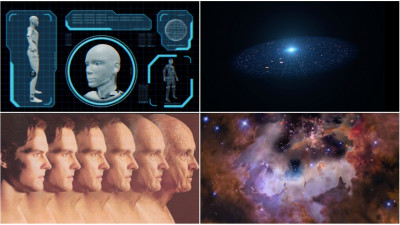E greu aici, pe Pământ. Și nu doar în România. Devine dificil să fii om. După mii de ani de evoluție, exemplarele acestei specii se văd nevoite să lupte pentru ceea ce credeau că au câștigat o dată pentru totdeauna: drepturi egale în a-și căuta fericirea. Se văd nevoite de a repeta istoria și de a se întoarce în momentele ei cele mai întunecate. Poate că în altă parte, e mai bine. Poate pe vreo planetă îndepărtată, aprope de capătul Universului, ființele au descoperit cel mai important secret dintre toate: să nu își facă rău.
Ieșeam în curte, în noțile de vară, și mă uitam înspre lumina roșie a lui Marte și spuneam ”Ia-mă acasă!”, scria Ray Bradbury, în Take Me Home.
Weekendul ăsta, ne uităm și noi spre cer și apoi, înapoi, spre Pământ. Poate călătoria ne va vindeca puțin resemnarea și ne va aduce aminte că plutim într-un Univers infinit, care ne rămâne de descoperit.
Where Did Earth's Water Come From?
When trying to figure out why our planet has water, scientists first had to theorize about how water formed in the universe.
There is a massive underground ocean located near Earth's core
There is a massive underground ocean located near Earth's core.
Here's What Would Happen If You Fell Through The Center Of The Earth
If you jumped through a vacuumed hole that cut through the center of the Earth, gravity would work against you. What would that mean? The passage wouldn't be as seamless as you'd think.
Here's What Happens If You Get Too Close To A Neutron Star
A neutron star is one of the most dangerous objects in the universe. Neutron stars are the densest things besides black holes. A stone sized piece of this star would weigh 100 million metric tons.
Solar System 101 | National Geographic
How many planets are in the solar system? How did it form in the Milky Way galaxy? Learn facts about the solar system’s genesis, plus its planets, moons, and asteroids.
Sun 101 | National Geographic
The sun keeps the planets in its orbit with a tremendous gravitational force. What would happen if it disappeared entirely? Learn about the star at the center of our solar system, and how it is critical to all life as we know it.
The Secret of the Dark Side of the Moon
Earth's gravity is so strong we only see one side of the orbiting moon. Modern exploration to the mysterious dark side revealed dramatic surprises and revised theories about the moon's formation.
What Would Happen If The Moon Disappeared
Our moon is on the move. Each year, it drifts an estimated 1.5 inches further away from Earth. And in the process, Earth's rotation is actually slowing down. What if one night, the moon simply disappeared? Would we miss it?
What Would Happen If The Earth Stopped Spinning?
Mars 101 | National Geographic
From its blood-like hue to its potential to sustain life, Mars has intrigued humankind for thousands of years. Learn how the red planet formed from gas and dust and what its polar ice caps mean for life as we know it.
Your kids might live on Mars. Here's how they'll survive | Stephen Petranek
It sounds like science fiction, but journalist Stephen Petranek considers it fact: within 20 years, humans will live on Mars. In this provocative talk, Petranek makes the case that humans will become a spacefaring species and describes in fascinating detail how we'll make Mars our next home. "Humans will survive no matter what happens on Earth," Petranek says. "We will never be the last of our kind."
Elon Musk Shouldn't Build Cities On Mars
In September 2017, SpaceX CEO, Elon Musk revealed his latest aspirations for colonizing Mars. His plan is to send the first humans to Mars in 2024 to build the foundations for the first Martian city. But is Mars really the best place for humans to settle?
What Would Happen If Humans Tried To Land On Jupiter
The best way to explore a new world is to land on it. That's why humans have sent spacecraft to the Moon, Venus, Mars, Saturn's moon, Titan, and more.
Why NASA won't send humans to Venus
Although Venus is easier to reach than Mars, scientists and space agencies around the world show little interest in exploring the planet. Why is it that they have so much enthusiasm in examining Mars but not our neighboring planet, Venus?
Uranus is officially the weirdest planet in our solar system
Uranus' magnetic field acts in a very different way from other planets. Understanding its nature could be key to finding alien life in the future. You can read more about the scientists' findings in The Journal of Geophysical Research: Space Physics.
What If Planet X Was Real?
Some scientists hypothesize that a mysterious, gigantic 9th planet may be lurking at our solar system’s edge. Why haven't we seen it yet?
How Long You Can Survive On Each Planet
We know how long a human being could survive on a summer day on Mars without a spacesuit. (Answer: not long at all.) But what about the other planets in our solar system?
Why is our universe fine-tuned for life? | Brian Greene
At the heart of modern cosmology is a mystery: Why does our universe appear so exquisitely tuned to create the conditions necessary for life? In this tour de force tour of some of science's biggest new discoveries, Brian Greene shows how the mind-boggling idea of a multiverse may hold the answer to the riddle.
Astronaut Chris Hadfield Debunks Space Myths | WIRED
Retired astronaut Chris Hadfield helps debunk (and confirm!) some common myths about space. Is there any sound in space? Does space smell like burnt steak? Is NASA working on warp speed?
40 years ago, NASA sent a message to aliens — here's what it says
In September 1977, NASA launched Voyager I from Cape Canaveral, Florida. The craft carried a golden record that contained a message to aliens from the people of Earth. Here's what it said.
Is There A Better Planet Out There For Us?
The discovery of several Earth-like planets outside the solar system has opened the possibilities of expanding our horizons and establish out first interstellar colonies. What would life be like on these 'super-Earths'? And if we ever got there... would we be able to leave?
The Terrifying Way Our Universe Will End — And When
Our universe is racing toward its destruction as we speak. The end is not going to be especially pleasant, but when that end will happen is still a point of contention amongst cosmologists.
Do we live in a multiverse? | The Economist
It has long been thought that our universe is all there is, but it is possible we may live in just one of many.
Dark Matter — The Greatest Mystery of The Universe | VICE on HBO
Dark matter and dark energy comprise the vast majority of our universe, but it is the biggest mystery in modern physics to figure out what they actually are.
String theory - Brian Greene
Physicist Brian Greene explains superstring theory, the idea that miniscule strands of energy vibrating in 11 dimensions create every particle and force in the universe.
Why does time pass? | The Economist
The equations of physics suggest time should be able to go backwards as well as forwards. Experience suggests, though, that it cannot. Why? And is time travel really possible?
Exploring the Arctic's Global Seed Vault
Located in the arctic circle, The Global Seed Vault isn't simply just a large storage facility for seeds from around the world. The vault is protecting the world's agricultural genetic diversity and protecting our future food supply in case of catastrophe.
Hunting for dinosaurs showed me our place in the universe | Kenneth Lacovara
What happens when you discover a dinosaur? Paleontologist Kenneth Lacovara details his unearthing of Dreadnoughtus — a 77-million-year-old sauropod that was as tall as a house and as heavy as a jumbo jet — and considers how amazingly improbable it is that a tiny mammal living in the cracks of the dinosaur world could evolve into a sentient being capable of understanding these magnificent creatures. Join him in a celebration of the Earth's geological history and contemplate our place in deep time.
Humanity Is Heading To The 'Point Of No Return' On Climate Change
Humanity will reach the 'point of no return' on climate change by 2035.
What If an Advanced Civilization of Humans Existed Millions of Years Ago?
How do we even know that we're the first advanced civilization to call the planet Earth home?
If humans disappeared from Earth
In Alan Weisman’s 2007 book “The World Without Us,” the author investigates what would happen if humanity mysteriously vanished from the globe. The world we’ve built would start to decay immediately, though traces of our past would last for thousands or even millions of years.


![[Weekend Watch List] Departe de casă, aproape de stele](https://media.iqads.ro/2018/10/collage24-cover-850.jpg?v=201810260607)






















